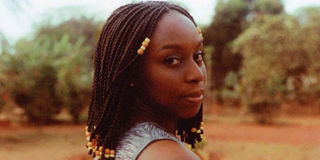War literature should stop thriving in Africa

PHOTO | FILE Nigerian author Chimamanda Adichie. The plot of her famous book Half of a Yellow Sun relied on the Biafran War.
What you need to know:
- Nyanchwani’s story wasn’t about war literature. It was about what feeds African literature
I read with interest Prof Emilia Ilieva’s article (Lifestyle, Jan 13, 2013) in which she misread Silas Nyanchwani’s article titled Why there are few Ngugi, Achebe successors (December 16, 2012). While Nyanchwani’s article touched on the supposed absence of “wars and turmoil” among young writers in Africa, the allusion was in passing.
As he rightly argues, literature “chronicles historical events” and more so in Africa where wars and conflicts are the norm rather than the exception. Any writing reflects on the “personhood” of the writer. The implication is that post-colonial writers fed on what my undergraduate professor called the “experience bank” in writing their literature. This is to mean what they wrote reflected their immediate lives and experiences. What they experienced were wars and conflicts. What else could they write about?
Ngugi wa Thiong’o, in all his works, recalls the struggle for independence and the accompanying memories of pain. Chinua Achebe summarises the incursion of white supremacists, the Biafran war and the general political demagoguery in the continent.
As Alfred North Whitehead said long before, “it is in literature that the concrete outlook of humanity receives its expression”. And it did with these eminent writers of Africa.
Wars and conflict
But 50 years after independence surely the thrust of African literature should move away from the drudgery that traverses the literary landscape: wars and conflict. I strongly believe this was the intention of Silas Nyanchwani, which the good professor failed to notice, deliberately or otherwise.
There hasn’t been any “loosening up” in literature classrooms to accommodate other subjects that afflict the continent. In fact, Nyanchwani admits as much when he says that part of Chimamanda Adichie’s Half of a Yellow Sun’s acclaim and worldwide fame had to do with its reliance on the Biafran war.
The question which the author asked, albeit silently, which I am wont to verbalise is, can’t there be more subjects – even new forms of conflicts and violence – that contemporary African literature should focus on? Indeed, he recognises that some African countries have had “recent” violence yet nothing seems forthcoming on the same.
He goes further to argue that part of the problem with this sorry state of affairs is the assumption that African literature is “rigid, pedantic and didactic”.
The world has changed, so has Africa. Shouldn’t its literature too?
Prof Ilieva’s comments should have focused on this. Instead, she buttressed Nyanchwani’s point that African literature has largely remained the same since Achebe wrote Things Fall Apart in the 50s.
In November 2012, I attended the Child and Youth Institute conference organised by Codesria in Dakar, Senegal. It was there that I first came into contact with Transit, one of the texts that Prof Ilieva talks about. It was the French copy and, since I couldn’t read French well, I asked about the English copy which I was informed Indiana University had released. I got the copy through Moi University.
Transit is an interesting read. On reading the text, one gets the feeling of déjà vu. It is the same narrative of many a post-colonial writer in Africa. It tells the story of a Djiboutian repressive regime and an intellectual who is against it (aren’t they always?).
But how is Abdourahman Waberi’s text different from Achebe’s or Ngugi’s or Orkut’s or Farrah’s?
It doesn’t help matters that Waberi’s is fairly recent a text, having been published in this millennium.
The continent has shifted and so have the issues. While we still have conflicts and violence, in Achebe’s time it was the intellectual who fought against undemocratic regimes, it is rarely the case now. The civil society has taken over.
Of course we have authors who have attempted to wade into the contemporary discourses, but their entry has largely remained unacknowledged.
As Nyanchwani wonders, why hasn’t Meja Mwangi been studied in secondary schools? Charles Mangua writes beautifully in excellent prose and dictum. Has his books been acknowledged as part of African literature?
Tony Mochama, the prolific journalist has so far penned three books, some have earned him literary awards abroad but on the continent I am yet to know if any has received acclaim.
Some scholars have argued that his writing is unconventional and doesn’t fit the confines of literature, I argue his style is unique and fresh. Exactly what we need!
Nyanchwani’s article wasn’t about war literature. It was about what feeds African literature. In the past war did, now it cannot. Should not. In sticking to the war narrative in classical literature and insistence on the same in new forms, the authors and their publishers continue what Chimamanda called “the single story narrative” which she, unfortunately, is a victim with the Biafran cause in her novel.
African war literature has had a long tradition, but in the words of Prof Ilieva it should stop from “thriving”.
Eddie Ombagi teaches literature at Kabianga University College




